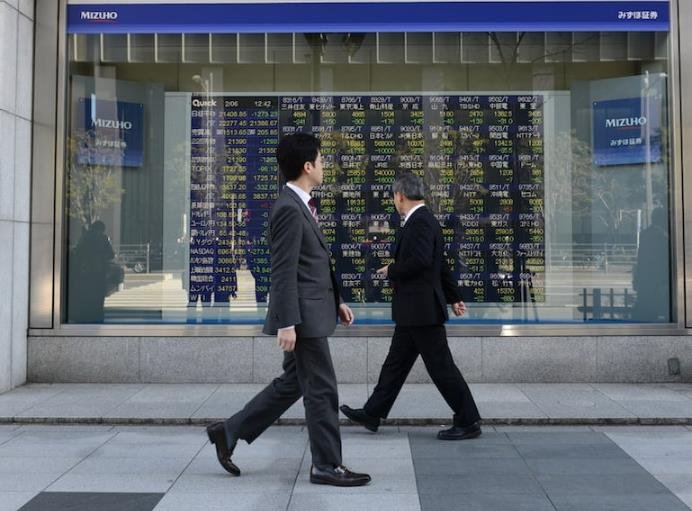Japan’s Nikkei 225 index closed up 0.96% at 39,277.39 on Tuesday, benefiting from the robust performance of Big Tech stocks that propelled the Nasdaq to a record high. This upward movement in the Nikkei reflects investor confidence in the technology sector, which continues to drive global market gains despite mixed performances in other regions.
Global Market Snapshot: Mixed Signals Across Asia and Europe
While Tokyo’s markets enjoyed gains, other major Asian indices experienced declines. Hong Kong’s Hang Seng dropped by 1.5% to 20,381.91, and the Shanghai Composite index fell 0.6% to 3,266.65. These downturns contrast sharply with the positive momentum in Japan and the United States, highlighting the diverse market dynamics at play.
Bank of Japan Initiates Two-Day Policy Meeting
The Nikkei’s rise comes as the Bank of Japan (BOJ) began its two-day policy meeting on Wednesday. Market participants are keenly observing the BOJ’s decisions, which could influence future monetary policies and impact investor sentiment. The central bank’s actions are critical in shaping the economic landscape, particularly in the context of global financial trends and domestic economic indicators.

EU Implements Stricter Tariffs on Chinese Electric Vehicles
In a significant trade development, the European Union has imposed higher tariffs on electric vehicles (EVs) imported from China, with rates reaching up to 45.3%. These tariffs, effective Wednesday, stem from over a year of anti-subsidy investigations aimed at addressing unfair competitive practices. The move has prompted swift countermeasures from Beijing, escalating trade tensions between the EU and China.
Key Details of the EU Tariff Implementation
- Tariff Rates: Up to 45.3% on Chinese electric vehicles
- Effective Date: Wednesday
- Reason: Result of anti-subsidy probes by the EU
- Impact: Increased costs for Chinese EV imports into the EU market
- Response: China’s Ministry of Commerce rejects the tariffs, citing unfair trade practices
Table: Performance of Major Global Indices on Tuesday
| Index | Performance |
|---|---|
| Nikkei 225 (Tokyo) | +0.96% |
| Hang Seng (Hong Kong) | -1.5% |
| Shanghai Composite | -0.6% |
| Nasdaq (USA) | Record High |
China’s Strong Opposition to EU Tariffs
China’s Ministry of Commerce issued a statement rejecting the EU’s new tariffs, labeling them as unjust and detrimental to fair trade. The ministry emphasized that the tariffs are not in line with international trade regulations and could harm the global electric vehicle market by limiting competition and increasing prices for consumers.
Impact of Tariffs on Global Electric Vehicle Market
The EU’s decision to impose steep tariffs on Chinese EVs is expected to have several repercussions:
- Market Dynamics: Chinese EV manufacturers may face reduced competitiveness in the European market.
- Consumer Prices: Higher tariffs could lead to increased prices for EVs in the EU, affecting consumer demand.
- Trade Relations: The tariffs may further strain trade relations between the EU and China, potentially leading to retaliatory measures.
- Industry Response: Chinese companies might seek alternative markets or adjust their pricing strategies to mitigate the impact of the tariffs.
Investor Sentiment and Future Outlook
The contrasting performances of global indices reflect varying investor sentiments influenced by regional economic policies and international trade developments. While Japan’s market remains optimistic due to strong tech performance, declining indices in Hong Kong and Shanghai signal concerns over regional economic stability and external trade pressures.
Investors are closely monitoring the outcomes of the BOJ’s policy meeting and the evolving trade negotiations between the EU and China. These factors will likely play a pivotal role in shaping market trends and investor strategies in the coming weeks.
Bullet Points: Implications of EU Tariffs on Chinese EVs
- Increased Import Costs: Chinese EVs will become more expensive in the EU, potentially reducing sales volumes.
- Competitive Disadvantage: Chinese manufacturers may struggle to compete with EU and other international brands.
- Supply Chain Adjustments: Companies might need to reorganize their supply chains to accommodate higher tariffs.
- Innovation Pressure: Increased costs could drive Chinese companies to innovate further to maintain market share.
- Global Trade Tensions: The tariffs may escalate into broader trade disputes, affecting global economic relations.
Broader Economic Impacts
The imposition of high tariffs on Chinese EVs by the EU not only affects the automotive sector but also has broader economic implications. It underscores the ongoing trade tensions between major economies and highlights the challenges of balancing protectionist policies with global trade liberalization efforts. As countries navigate these complexities, the global market remains sensitive to policy changes that can significantly influence economic stability and growth.








